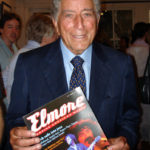
Forty-five years ago, Moody Blues co-leader John Lodge penned what is arguably the greatest understatement in all of popular music:
“I’m just a singer in a rock and roll band.”
Bear in mind, this was two years before the Stones proclaimed, “I know it’s only rock and roll, but I like it.” It’s as if Lodge felt his life and artistic contributions were so infinitesimal they paled in comparison to the world’s population and plights. Nothing could be further from the truth.
The Moody Blues are understated legends, largely the result of the musical brotherhood of Lodge and bandmate Justin Hayward. Even after more than 15 studio albums, they continue to play for throngs of adoring fans who clamor for their thought-provoking prog rock staples.
Like me, Lodge is taking to the seas for Cruise to the Edge next week. Though on board with his own group, the 10,000 Light Years Band, Lodge will be performing a potpourri of Moodies tunes (some slightly modified), solo tracks and tunes never performed live despite repeated fan requests (“Candle of Life,” “Saved By The Music”).
The timing couldn’t be better. Recently, Lodge dove deep into the annals of Moodies history, waxing poetic with Elmore about two of the most important albums in the group’s discography, each celebrating a major anniversary milestone. These include the seminal Days of Future Passed (turning 50 this year), and the Moodies’ magnificent 1981 American comeback album, Long Distance Voyager (which recently turned 35).
“Days of Future Passed was just a remarkable period of time for us. Up until then we had been covering mostly American songs and, to be honest, I found it difficult singing about the blues from Memphis… when I had never been to America before. It was incongruous to me really,” Lodge said. “So we decided to write our own stage show.”
This idea spawned Decca Records’ suggestion that the band combine pop with symphonic music for their next album. Amazingly, despite its layered instrumentation and sound quality (and that’s just on the seven-and-a-half-minute opus “Nights in White Satin” alone), the album’s recording lasted only a week and was all done on four-track equipment.
“We’d record two tracks and then as the two tracks went to another machine, we’d add instruments to it. So there was no going back; you had to commit,” Lodge said. “I remember we were listening to the playback and thinking, “What have we done?” When we heard it for the first time, to be honest, it was quite mind-blowing.”

Released in 1967, Days of Future Passed would go on to peak at number three in America… five years after it was released. “Nights in White Satin” (albeit edited) would ultimately claim the number two position on the Hot 100, also in 1972.
Fast-forward to 1981 (and seven albums later) – the band took to their own studio, Threshold, to work on Long Distance Voyager. It had been three years since the release of their last album Octave (at the time their first album in six years) – a seemingly nightmarish experience for the group. Perhaps that’s why the album contains such dark numbers as “Steppin’ in a Slide Zone.”
“Octave, although it was a really good album, was a really difficult album to make because we had so many things go wrong,” Lodge said. “The Record Plant where we were recording in L.A. had burned down while we were recording it. Our producer had personal problems… I always thought it was probably a rotten time to make that album.”
With nothing to lose, the group set about making what would become perhaps their greatest comeback album. Long Distance Voyager features two of the Moodies’ Top 20 U.S. hits, the ethereal “The Voice” (#15) and the synth-driven rocker “Gemini Dream” (#12).
“It was a strange time, particularly in England. It was the time of punk. We thought, “I wonder how our record’s going to really sit.” But it did. Everyone seemed to be waiting for the Moodies’ album,” Lodge said. “It was an incredible success.”
One reason for this could be the fresh blood that permeates through Long Distance Voyager – the inclusion of former Yes keyboardist (circa Relayer) Patrick Moraz (also a performer at Cruise to the Edge this year). Moraz replaced longtime Moodies keyboardist Mike Pinder, and would last with the group from 1978 to 1991. Sadly, an acrimonious divide over royalties and member status within the band lead to an emotional Moraz vs. Moodies court battle one year later.
Still, Lodge remains positive in speaking about Moraz’s contributions to the band.
“Patrick was great. I got on very well with Patrick, and I thought he would be the right person for the Moodies because he had the musical intellect. Also, he knew all about computers and programming and what we were trying to do,” he said. “Patrick was a real boon to be on the road with because his stage presence was very good. I really enjoyed working with him.”
Lodge adds: “It’s going to be interesting to see Patrick on the cruise. That will be interesting.”
Long Distance Voyager, which also boasts great underrated Moodies tracks like “Meanwhile” and “22,000 Days,” established a huge wave of success in the 1980s for the group, culminating in the hit singles “Your Wildest Dreams” and “I Know You’re Out There Somewhere.” For Lodge, even though the decades have passed, this year’s Cruise is a prime chance to break out what the fans love while continuing to stun them in fresher ways.
And I, for one, look forward to riding the musical see-saw with him as we take to the seas.
-Ira Kantor
Dig the column? Reach out to Ira via email at ikantor84@gmail.com or on Twitter at @ira_kantor







Is there any band that tries to emulate the Moody Blues?
Is there anybody who could emulate them????
Often imitated, never equaled.
yes I am sure patrick moraz will be interesting on the cruise. he was awarded about $80000 in his lawsuit.. and was generally bad mouthed by the Moodies who said he was just a side man etc..( patrick bad mouthed the Moodies ina Keyboard Mag article)
I believe he was offered a settlement of quite a bit more money which he turned down..his awkward court case is on Youtube..guess time heals all ;=)
John reached out to Mike Pinder, who performed on John’s solo Album. I think if John had his way, Pinder would be performing with the Moodies on the DOFP 50th tour. I think the split with Pinder might be what!s keeping them out of the R&RHOF.